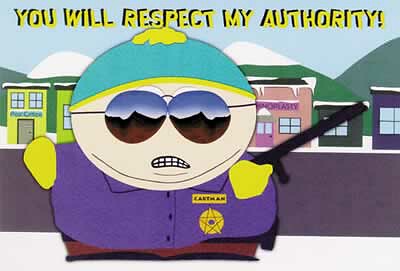Write it Like You Own It: Defining Online Content Authority
August 22nd, 2012 by


Better do what he says, honey. He's got a badge.
As a writer, one of the first and most integral choices you have to make before you put one single word onto the page is disarmingly simple, and yet deceivingly complex: what authority, if any, do I have?
The answer to this one simple question will define the tone of whatever it is you are writing. It doesn’t matter if you are delicately constructing a poem, building a larger narrative one matchstick at a time, or sitting down to crank out 250 words for a roofing company’s website as a freelancer, you have to know where you stand, especially if you are using content to build online authority.
Own Your Online Content
Are you the absolute authority and source of definitive knowledge on this subject? Are you satirizing something? Do you want to expose the faults in an argument? Are you lacing your content with subtle humor? Do you just have to tell the reader when this business opens and what services they provide in the most direct way possible?
All of these questions can be answered by determining where you, as the content creator, exist in relation to what you are producing. Sound simple? Well, there are a whole bunch of ways you can screw this up.
I’ve been writing online content for a few years now, and I can tell you one of the most fundamental ways to mess up website copy is to write it in the third person. That can confuse and otherwise turn off a potential customer pretty quickly, and it is difficult to create the kind of authoritative content you need when you don’t know where you as the author stand.
High Quality Content
So there’s been a big storm, and you wake up with a tree limb speared straight through the roof of your guest bedroom. You stand there, scratching your head, wondering how you are going to find a roofer that will come out and patch your roof before it starts raining again.
Suddenly, you remember something… the internet! You reach into the pocket of your Star Wars pajamas (I can’t be the only one to still wear these to bed every night, right?) grab your cell phone, tap the app that brings you to Google, and type in “24 hour roofer.”
The very first site on the list looks great. The name of the business is actually “24 Hour Roofer.” Perfect, right? So you click on the link, wait for it to load, because AT&T, and then when you finally get the site open, you are greeted with this:
“24 Hour Roofer is a great place for roofing. They can come help you right away. They have been doing this for a while now, and they can replace your roof quickly. You should call them.”


Admit it. You're jealous.
Now, it’s important to note that you aren’t looking at Yelp reviews. You are looking at the actual site. Who is telling you this? Is it someone who works there? If so, why are they not saying “we?” Is this some sort of testimonial? If so, who is testifying?
Why are people staring at me? Are they just jealous of my sweet PJ’s? What is going on? Ahhhhh!
See how this can quickly lead to an existential dilemma? You know what can prevent it? Good, clean copy written in an authoritative voice.
In other words, write it like you own it, even if you’ve never even heard of the business:
“Roof problems? Come to 24 Hour Roofing. With over 40 years of experience, we can patch, repair, or replace your roof, no matter how damaged or worn out it is. As a locally owned and operated business, you can trust us to be there when you need us. Call today!”
Problem solved! These guys sound awesome. Whoever wrote that content knows what I am looking for, and they are clearly telling me how to get it. That’s exactly what I needed! Now back inside! Froot Loops for everyone!
Tone Makes all the Difference
If you are writing something for yourself, your tone and sense of authority can come naturally, but it becomes much trickier if you are creating content as a freelancer who has never actually used the business and who really didn’t know it even existed half an hour ago.
Your job is to write like you own the place. A clear sense of ownership really comes through the writing and can create a sense of trust and reliability that may seem intangible but can really go a long way with a potential client.
Like anything else, this is an acquired skill. The more content you create that clearly lays out the who, what, where, why, and how in a direct way, the better you will be at making your eventual reader believe you are an authority on this topic, no matter what kind of “childish” pajamas you wear.
Have you ever had an experience with bad or poorly written content on a site that scared you away?

